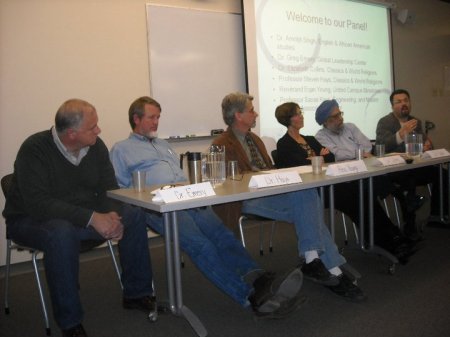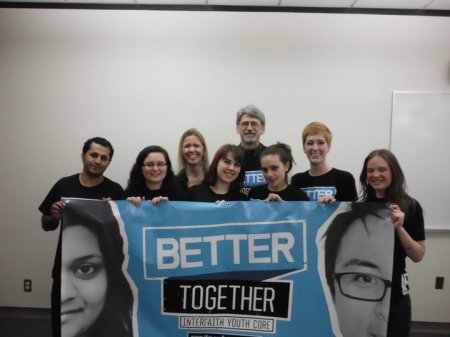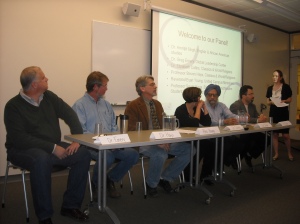My parents converted from Judaism to the Indian religion of Sikhism before I was born, so I self-identify as a Sikh. Though I do not practice as rigorously as I once did, I still hold the Sikh faith in my heart. There is a huge amount of Sikh scripture, theology and personal leadership encouraging service to others. One of the core concepts of Sikhism is Seva, or selfless service to others as a way of serving the Lord. Sikhs throughout the world are famous for hosting frequent and generous free meal programs (langar).
I, along with the rest of the Interfaith Steering Committee, partnered with United Campus Ministry to spearhead the interfaith movement on Ohio University’s campus this past year. We selected the issue of local and international water pollution to organize around, as we believe access to clean water is a fundamental human right.
I worked with these interfaith leaders on campus—Muslims, Jews, Christians, Agnostics—to combat water pollution in the local Athens community and in Haiti. I was deeply and continually inspired by their determination to serve others. And I realized that many of them, like me, draw their inspiration to serve from their varied faith and philosophical traditions.
What if religion was used as a force to unite us and not divide us? This past fall, we asked that very question.
Over 70 students, faculty and local religious leaders came to the “What If? Speak In” held at Alden Library this past fall. Students heard from a multidisciplinary faculty panel that included Sikh, Muslim and Christian professors from diverse academic departments—all discussed the importance of interfaith cooperation, at Ohio University and in the world.
Students left the event inspired to come together to create a climate of religious pluralism at Ohio University, and to tackle the issue of water pollution on both a local and international level. Students discussed personal “faith heroes” such as Gandhi who inspire them, and their vision of what changes they would like to see regarding the interaction of different faith communities on campus.
Rachel Whitman, a senior at Ohio University on the interfaith steering committee who identifies with the Jewish faith, said: “Each religious group at Ohio University I have been part of has been isolated from the others. That needs to change.”
In March, over 50 Ohio University students, faculty and community members of all and no faith background gathered at United Campus Ministry for an interfaith fundraiser for Haiti.
Dr. Marc Scarcelli of the Political Science department discussed post-earthquake Haiti. He said that the number one cause of death among children in Haiti is diarrhea, a disease that is 100 percent preventable with access to filtered water.
Contributions totaled about $250. This was enough to send 50 LifeStraws (personal water filters) to Haiti, thereby providing about 50 Haitian citizens with clean water for one year.
In late April, Ohio University students and faculty partnered with the non-profit organization Rural Action to remove trash, old mattresses and used car tires from local water sources in Perry County in the interfaith Better Together Stream Clean Up. Students removed hundreds of pounds of trash from the water in the daylong event.
Mike Steinmas, the Watershed Coordinator for the Monday Creek Restoration Project, commented on the work of the interfaith team: “Thanks for your help in organizing the clean up of Monday Creek. Having a clean embankment is a definite improvement, both environmentally and aesthetically.”
In mid-April, over 30 Ohio University students, faculty and local religious leaders gathered in the library once more, this time to celebrate the power of interfaith cooperation, and the impact of interfaith service projects in the OU community at the “Better Together Bash.”
Brian Bridges, Provost for Diversity, Access and Equity, gave an opening address, urging students to participate in President Obama’s Interfaith and Community Service Campus Challenge and discussing the importance of interfaith cooperation at in the campus community and in the world.
“Interfaith cooperation serves as a catalyst for promoting peace through shared values while mitigating conflict in the community and in the world at large” he said.
Bridges continued, stating that emphasizing the importance of racial diversity is a mainstay at most college campuses, but that the vital topic of religious diversity is too often missing from such conversations.
I am excited to announce that Ohio University plans to build on our work this year through participation in President Obama’s Interfaith and Community Service Challenge. The Office of Diversity, Access and Equity will be essential partners in this effort, and we are honored to be working with them and continuing our work with United Campus Ministry on this important initiative through the 2011-2012 academic year.
This can be our moment. The work of interfaith leaders at campuses across the country has inspired the president of the United States to show his support for interfaith action. We’ve proved what’s possible this year, and it seems clear that we are indeed better together.
Guru Amrit Khalsa is a senior at Ohio University majoring in journalism, with a concentration in world religions and global leadership. She is the treasurer of Interfaith Impact, and recently completed a fellowship with the Interfaith Youth Core, where she coordinated and executed IFYC’s signature ‘Better Together Campaign.’









 Posted by ouinterfaith
Posted by ouinterfaith 



